CCIO Annual Gathering
The Council of Clinical Information Officers met on Tuesday 15th May for their annual gathering. The packed agenda for the event included a talk on cross-border patient summaries and ePrescribing; how medical genetics is used for diagnosis and treatment of complex conditions; a Summit on SNOMED; as well as a briefing on the imminent GDPR regulations and an opportunity to meet and have an introductory talk from the new HSE CIO, Martin Curley.
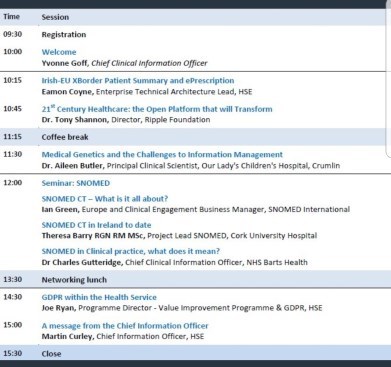
Presentations
The session Chairperson was Seamus MacSuimhne who introduced the speakers and the opening address was given by Chief Clinical Information Officer Yvonne Goff.
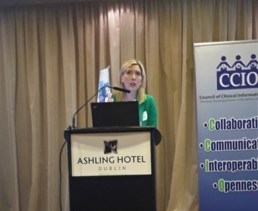
She outlined upcoming initiatives such as the online Innovation in Healthcare Repository and Clinical Risk Management Framework. In welcoming all delegates she reminded them of the leading role that the Council of Clinical Information Officers is taking in delivering technology that is clinically-led and patient-focused in Ireland. She spoke of the quarterly eHealth Ireland Ecosystem events which continue to reinforce connections between eHealth stakeholders – attracting and encouraging participation from clinicians, researchers, patient organisations, start-ups, and innovators.
She told the gathered members that “the expert is in all of us who have ideas to deliver enhanced healthcare and the key to building on this is working together in partnership”. The Electronic Health Record was identified as the main priority and Yvonne stressed the importance of continued clinical input in driving the initiative forward.
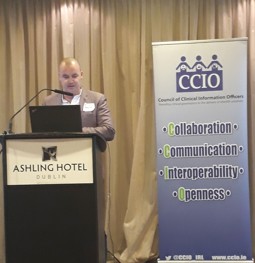
Eamon Coyne, Enterprise Technical Architecture Lead from OoCIO spoke about the Cross-border patient summary and ePrescribing programmes. At the completion of this programme, if you require unscheduled care anywhere in Europe, local medical centres and clinical staff can logon to an online portal where they can view your patient summary and clinical data, including information such as alerts, history of past illnesses, medical problems and current medication summary. In addition, Pharmacists will also be able to access ePrescriptions. So if you forget to bring prescription medication with you (or it’s too heavy or bulky to carry in your suitcase!), your prescription can be accessed and filled by the local Pharmacist.
Eamon and his team have worked closely with the CCIO on this ambitious project which demonstrates excellent synergy between technology and clinical expertise. Testing begins in Q4 of this year and the Cross-border Go-live is scheduled for Q3 2020.
The next speaker was Dr Tony Shannon, Director of the Ripple Foundation who discussed how Open Standards and Platforms can transform Healthcare. He said “no matter what we do, we can’t make staff work much harder, instead we need to work smarter." He spoke about co-operativism - people working together on open source digital health tools in the shrinking global market and also gave an example of how Leeds Health trust are empowering the patient with patient-held health records.
He invited everyone to get involved in the movement towards open platform development of health IT with patient-centred, vendor-neutral solutions. You can get more information by following @rippleOSI on Twitter, or from Http://ripple.foundation
Dr Aileen Butler, Principal Clinical Scientist, Our Lady’s Children’s Hospital, Crumlin, gave a talk on Medical Genetics which covers patient DNA and clinical diagnostics, and the challenges of information management.
She started by outlining the recent advances in Genetics in Ireland and the potential life changing benefits of using genetics for targeted medical intervention. She then spoke about the Information Management challenge, which arises when trying to determine if a result of genetic screening is clinically actionable. A multidisciplinary team can spend half a day on one variant of unspecified significance (VUS) before making a decision, because the stakes are so high. They need to use best known data to determine whether to reclassify the VUS’s as clinically actionable.
She said she would like to see all stakeholders: clinicians, ICT and academia, get together to find a way forward for overcoming these significant and important challenges and to identify the essential tools needed to determine clinical risks so we can better serve our patients.
SNOMED Seminar
SNOMED CT (Systemised Nomenclature of Medicine for Clinical Terms) is an internationally recognised system for defining terminology used for digital health records and it is also a collection of medical terms providing codes, terms, synonyms and definitions used in clinical documentation and reporting.
Ian Green, (Europe and Clinical Engagement Business Manager, SNOMED International) introduced SNOMED as the most comprehensive multilingual clinical terminology dictionary and discussed its features and how it is the accepted standard in more than 50 countries worldwide. At a simplistic level, SNOMED aims to deal with challenges such as the fact that in different countries some words can have totally different meanings (e.g. pain in French = bread). They are actively collaborating with other data dictionary providers globally to enable SNOMED CT to interoperate with other information standards and all providers have agreed joint deliverables.
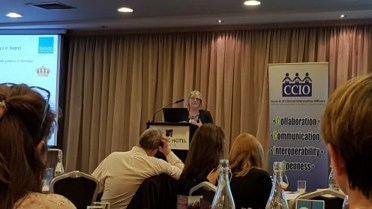
Theresa Barry, a midwife from Cork University Hospital who is working with the OoCIO Enterprise Architecture team is another exemplar of the synergy between Clinicians and OoCIO. She gave a comprehensive description of the project to create a National Resource Centre (NRC) for SNOMED. She outlined the history of SNOMED in Ireland which started as a HIQA recommendation in May 2014 to introduce it gradually.
Theresa spoke of the work involved in being a member of SNOMED and the functions of the NRC, which includes the issuing of user licenses. The national license for SNOMED resides with the HSE but can be used (free of charge) by any healthcare provider.
The rollout will be in the second half of this year. Education and training information is available on the SNOMED website. Webinars are planned to be held towards the end of the year.
A new case study will be made available in our Case Study section in the coming weeks, which will give lots more information on SNOMED for those who are interested.
After lunch we heard from Joe Ryan, national interim Data Protection Officer who was given the task of ensuring the HSE was GDPR-ready. He introduced it by saying it was a minimum 2yr project which he was given 5 months ago! However, he said, we are not starting from zero and we have had data protection for some time. Joe took the CCIO through the articles of GDPR that have special significance to the HSE, as data held for medical purposes has different classifications to other data.
For more information on GDPR, there is an FAQ on www.hse.ie/eng/gdpr
Mandatory GDPR training for all staff will shortly be provided on HSEland
The last speaker of the day was the new HSE CIO, Martin Curley.
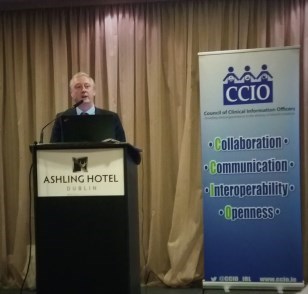
Martin spoke about the quality of the eHealth Strategy and how he is looking to use the IT Capability Maturity Framework to evolve from the strategy we currently have to delivering a world class eHealth offering. Martin spoke about Moore’s Law which was an observation made in 1965 by the co-founder of Intel, George Moore, that the numbers of transistors per square inch would double on integrated circuits every year. This became the innovation strategy for the semiconductor industry worldwide and became a challenge which drove growth in the industry from companies worldwide. Martin told us he believed there is an opportunity for us to create a Moore’s Law for eHealth in Ireland if we are willing to rise to the challenge.
He also spoke about the National Health Strategy and determining what the ICT priorities are and what our optimal sequence of delivering systems should be. He proposes the use of a data-driven scientific approach which will deliver a much higher conversion efficiency which ultimately delivers a higher value for money spent.
Martin noted the importance of the CCIO in driving innovation and progress in eHealth. In his previous role, he worked in Intel and said 70% of the biggest innovations over the last 30 years came from lead users and not from the labs or the boardrooms. Martin spoke of using Quadruple Helix Innovation where Government, Academia, Industry and Citizens collaborate together to deliver structural changes beyond the scope that any organisation could achieve on its own.
One potential shared vision for eHealth, he described, was to shift the focus from costly acute care settings to preventative, proactive, mobile, home based & community care. He explained the Shift Left Strategy for the continuum of care, where every time we shift to the left we will reduce the cost of care and improve the quality of life and the quality of care of our citizens.
Speaking after the event Martin said:
“It is great to have such an engaged community of clinical information officers to partner with. Working together we can help drive the digital transformation opportunity that stands before us.”
Yvonne Goff said
“Today reinforced for me how strong the Council has grown, such a rich network of learning and a huge asset to our Ecosystem”
If you would like to sign up for bi-monthly eHealth Ireland updates, click here
